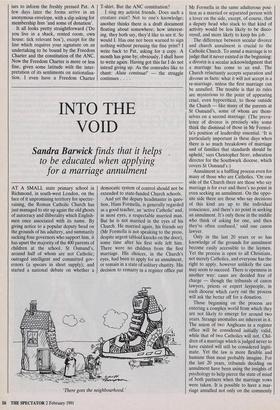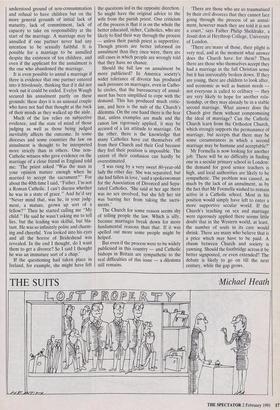INTO THE VOID
to be educated when applying for a marriage annulment
AT A SMALL state primary school in Richmond, in south-west London, on the face of it unpromising territory for spectre- raising, the Roman Catholic Church has just managed to stir up again the old ghosts of autocracy and illiberality which English- men once associated with its name. By giving notice to a popular deputy head on the grounds of his adultery, and summarily sacking four governors who support him, it has upset the majority of the 400 parents of children at the school, St Osmund's, around half of whom are not Catholic; outraged intelligent and committed gov- ernors (a species in short supply); and started a national debate on whether a democatic system of control should not be extended to state-funded Church schools.
And yet the deputy headmaster in ques- tion, Hans Formella, is generally regarded as a good teacher, an 'active Catholic' and, in most eyes, a respectable married man. But he is not married in the eyes of his Church. He married again, his friends say (Mr Formella is not speaking to the press, despite urgent tabloid knocks on the door), some time after his first wife left him. There were no children from the first marriage. His choices, in the Church's eyes, had been to apply for an annulment, or remain in a state of solitary chastity. His decision to remarry in a register office put 'There goes the neighbourhood.' 'Mr Formella in the same adulterous posi- tion as a married or separated person with a lover on the side, except, of course, that a deputy head who stuck to that kind of activity would be less likely to be disco- vered, and more likely to keep his job.
The difference between secular divorce and church annulment is crucial to the Catholic Church. To annul a marriage is to judge that it never existed in the beginning: a divorce is a secular acknowledgment that a marriage has come to an end. The Church reluctantly accepts separation and divorce as facts: what it will not accept is a re-marriage, unless the first marriage can be annulled. The trouble is that its rules are mysterious to the point of appearing cruel, even hypocritical, to those outside the Church — like many of the parents at St Osmund's, some of whom are them- selves on a second marriage. (The preva- lence of divorce is precisely why some think the dismissal of those in Mr Formel- la's position of leadership essential. 'It is particularly important in these days when there is so much breakdown of marriage and of families that standards should be upheld,' says Christopher Storr, education director for the Southwark diocese, which covers St Osmund's.) Annulment is a baffling process even for many of those who are Catholics. 'On one side of the Church there are those who say marriage is for ever and there's no point in even seeking an annulment. On the oppo- site side there are those who say decisions of this kind are up to the individual conscience, and there's no point in seeking an annulment. It's only those in the middle who think of asking for one, and then they're often confused,' said one canon lawyer.
Only in the last 20 years or so has knowledge of the grounds for annulment become easily accessible to the laymen. Yet the process is open to all Christians, not merely Catholics, and everyone has the right to apply, however unlikely the case may seem to succeed. There is openness in another way: cases are decided free of charge — though the tribunals of canon lawyers, priests or expert laypeople, in each diocese which carry out the process will ask the better off for a donation.
Those beginning on the process are entering a complex world from which they are not likely to emerge for around two years. Strange anomalies are inherent in it. The union of two Anglicans in a register office will be considered initially valid, while that of two Catholics will not. Chil- dren of a marriage which is judged never to have existed will still be considered legiti- mate. Yet the law is more flexible and humane than most probably imagine. For the last 20 years, tribunals deciding on annulment have been using the insights of psychology to help pierce the state of mind of both partners when the marriage vows were taken. It is possible to have a mar- riage annulled not only on the commonly
understood ground of non-consummation and refusal to have children but on the more general grounds of initial lack of maturity, lack of commitment, lack of capacity to take on responsibility at the start of the marriage. A marriage may be annulled if one partner never had any intention to be sexually faithful. It is possible for a marriage to be annulled despite the existence of ten children, and even if the applicant for the annulment is the one who abandoned the marriage.
It is even possible to annul a marriage if there is evidence that one partner entered into it frivolously, thinking that if it did not work out it could be ended. Evelyn Waugh secured his annulment partly on these grounds: these days it is an unusual couple who have not had that thought at the back of their minds as they walked up the aisle.
Much of the law relies on subjective evidence, and the state of mind of those judging as well as those being judged inevitably affects the outcome. In some dioceses and some countries the law on annulment is thought to be interpreted more strictly than in others. One non- Catholic witness who gave evidence on the marriage of a close friend in England told me: 'The priest asked "Was the man in your opinion mature enough when he married to accept the sacrament?" For about the 40th time I said, "Father, I'm not a Roman Catholic. I can't discuss whether he was in a state of grace." And he'd say "Never mind that, was he, in your judg- ment, a mature, grown up sort of a fellow?" Then he started calling me "My child." He said he wasn't asking me to tell lies, but the leading was skilful, but bla- tant. He was so infinitely polite and charm- ing and cheerful. You looked into his eyes and all the horror of Brideshead was revealed. In the end I thought, do I want them to get a divorce? So I said I thought he was an immature sort of a chap.'
If the questioning had taken place in Ireland, for example, she might have felt
the questions led in the opposite direction. So might have the original advice to the wife from the parish priest. One criticism of the process is that it is on the whole the better educated, richer, Catholics, who are likely to find their way through the process — unless their parish priest is supportive. Though priests are better informed on annulment than they once were, there are still cases in which people are wrongly told that they have no chance.
Should the full law on annulment be more publicised? In America society's wider tolerance of divorce has produced such pressure on marriages, even in Catho- lic circles, that the bureaucracy of annul- ment has been simplified to cope with the demand. This has produced much critic- ism, and here is the nub of the Church's dilemma. On the one hand there is the fear that, unless examples are made and the canon law rigorously applied, it may be accused of a lax attitude to marriage. On the other, there is the knowledge that many Catholics have cut themselves off from their Church and their God because they feel their position is impossible. The extent of their confusion can hardly be overestimated.
`I was rung by a very sweet 80-year-old lady the other day. She was separated, but she had fallen in love,' said a spokeswoman for the Association of Divorced and Sepa- rated Catholics. 'She said at her age there was no sex involved, but she felt her sin was barring her from taking the sacra- ments.'
The Church for some reason seems shy of telling people the law. Which is silly, because marriages break down for more fundamental reasons than that. If it was spelled out more some people might be helped.
But even if the process were to be widely publicised in this country — and Catholic bishops in Britain are sympathetic to the real difficulties of this issue — a dilemma still remains.
`There are those who are so traumatised by their civil divorces that they cannot face going through the process of an annul- ment, however much they are told it is not a court,' says Father Philip Sheldrake, a Jesuit don at Heythrop College, University of London.
`There are many of those, their plight is very real, and at the moment what answer does the Church have for them? Then there are those who themselves accept they had a marriage in the full Christian sense but it has irrevocably broken down. If they are young, there are children to look after, and economic as well as human needs not everyone is called to celibacy — they are very likely to hope for another rela- tionship, or they may already be in a stable second marriage. What answer does the Church give them without compromising the ideal of marriage? Can the Catholic Church learn from the Orthodox Church, which strongly supports the permanance of marriage, but accepts that there may be some circumstances in which a second marriage may be humane and acceptable?'
Mr Formella is now looking for another job. There will be no difficulty in finding one in a secular primary school in London: the demand for good senior teachers is high, and local authorities are likely to be sympathetic. The problem was caused, as much by the lack of an annulment, as by the fact that Mr Formella wished to remain active in a Catholic school. Most in his position would simply have left to enter a more supportive secular world. If the Church's teaching on sex and marriage were rigorously applied there seems little doubt that in the Western world, at least, the number of souls in its care would shrink. There are many who believe that is a price which may have to be paid. A chasm between Church and society is yawning. Should the footbridge across it be better signposted, or even extended? The debate is likely to go on till the next century, while the gap grows.



















































 Previous page
Previous page